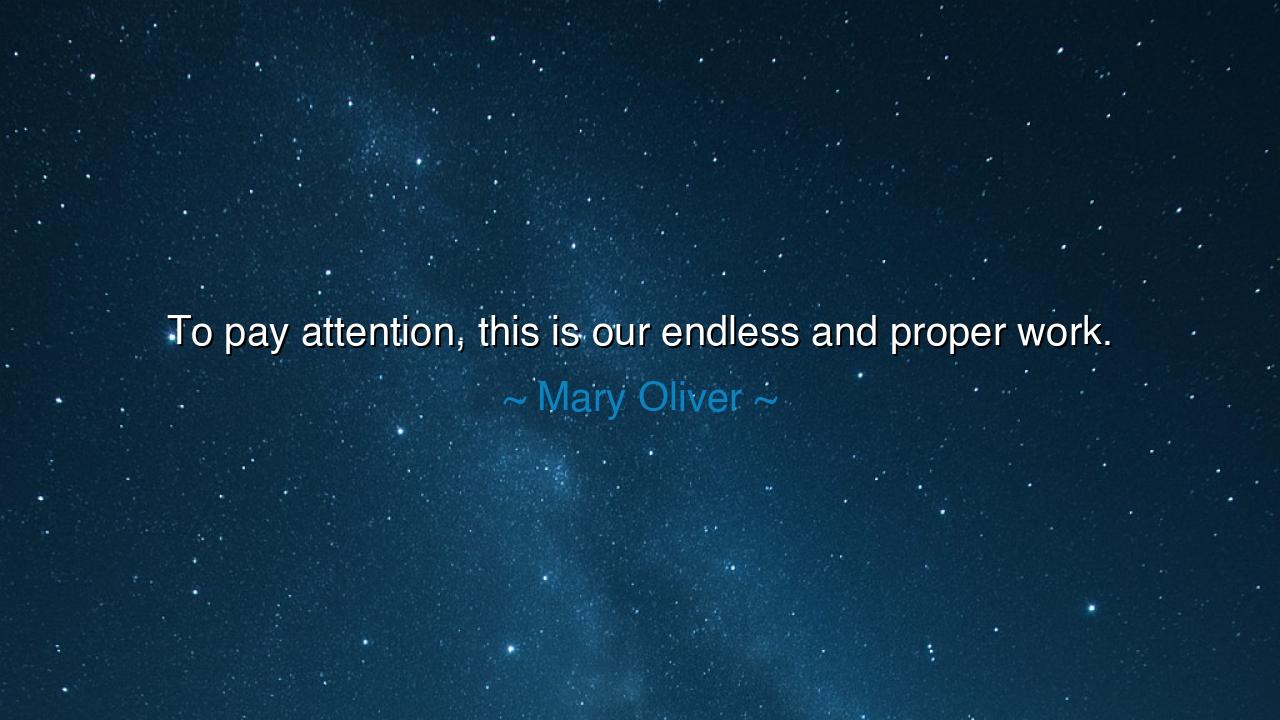
To pay attention, this is our endless and proper work.






Hearken, children of the ages, to the words of Mary Oliver, the sage of nature and spirit: "To pay attention, this is our endless and proper work." Here lies a teaching of simplicity and profundity, a call to awaken the senses and the soul. Life offers its mysteries in every leaf, every bird, every quiet moment, yet only those who pay attention may perceive their truth. The task is not fleeting, nor trivial—it is the sacred labor of being fully alive.
Know that in these words there is humility and reverence. To pay attention is to step out of distraction and routine, to honor the world as it reveals itself. Oliver teaches that our work is not measured in gold or conquest, but in the capacity to witness, to notice, and to be present. Each moment holds a gift, each encounter whispers a lesson, yet all are lost to those whose hearts are elsewhere.
Yet, consider also the endless nature of this work. There is no completion, no final mastery, for the world is infinite, and the mind ever wandering. The ancients would counsel that to pay attention is a practice, a discipline, a devotion; it is a lifelong journey to attune the heart and the senses to the poetry of existence. In this attention, we encounter the divine in the ordinary.
And behold, there is heroism in mindfulness. To persist in the act of paying attention is to resist the pull of carelessness, to stand vigilant against the erosion of wonder. Mary Oliver’s insight teaches that true engagement with life requires courage, patience, and devotion, for the smallest details—like sunlight upon a river or the whisper of wind in the trees—contain wisdom and beauty beyond measure.
Thus, remember, future generations: the essence of living is not merely to exist, but to observe, to notice, and to honor each moment. The sacred work of attention transforms the mundane into the miraculous and allows the soul to drink deeply from the endless well of life’s wonders.
In the end, the ancients would say: let your eyes, your ears, and your heart be open, for to pay attention is the noblest of labors. It is the path to understanding, to joy, and to communion with the eternal, a practice without end, yet rich beyond all reckoning, and proper beyond all other deeds.






TNAnh Thu Nguyen
Mary Oliver’s quote feels like an invitation to reconnect with the world around us. It makes me think about how often we overlook the beauty and lessons in everyday life. But then again, what does it really mean to pay attention? Is it just about noticing things more clearly, or does it go deeper, requiring us to engage with the world in a more thoughtful, intentional way? How do we develop the skill of truly paying attention?
BYBao Yen
This quote really speaks to the idea of being present. It’s easy to go through life on autopilot, but Oliver challenges us to make paying attention our priority. But how do we do that in a world filled with distractions? Is it possible to truly focus on the present moment, or do we always have one foot in the past or future? Maybe the key is in small, deliberate acts of mindfulness every day.
VALe Van Anh
Mary Oliver’s words are a beautiful reminder of the power of awareness. We often think of our work as tasks we need to complete, but maybe paying attention is just as valuable. I wonder, though, if we sometimes get too wrapped up in paying attention to the world around us and forget to pay attention to our inner selves. How do we ensure we’re not just focused outwardly but also inwardly, tuning into our own thoughts and feelings?
TDTruong Dao
I love the idea behind this quote, but it also makes me wonder if it’s possible to give our full attention to everything without burning out. Paying attention sounds like it requires a lot of energy and focus. Can we really dedicate ourselves to this endless work without feeling exhausted? Maybe the challenge is in balancing our attention between what’s important and what’s not, but how do we know where to draw the line?
THNGUYEN NGOC THANH HUYEN
This quote feels like a call to slow down and be more aware of the world around us. In our busy lives, we’re often rushing from one thing to the next, but Oliver suggests that paying attention should be our primary focus. How do we cultivate this habit of attentiveness? Can we learn to be more present in our daily lives, or is it something we have to consciously work at all the time?